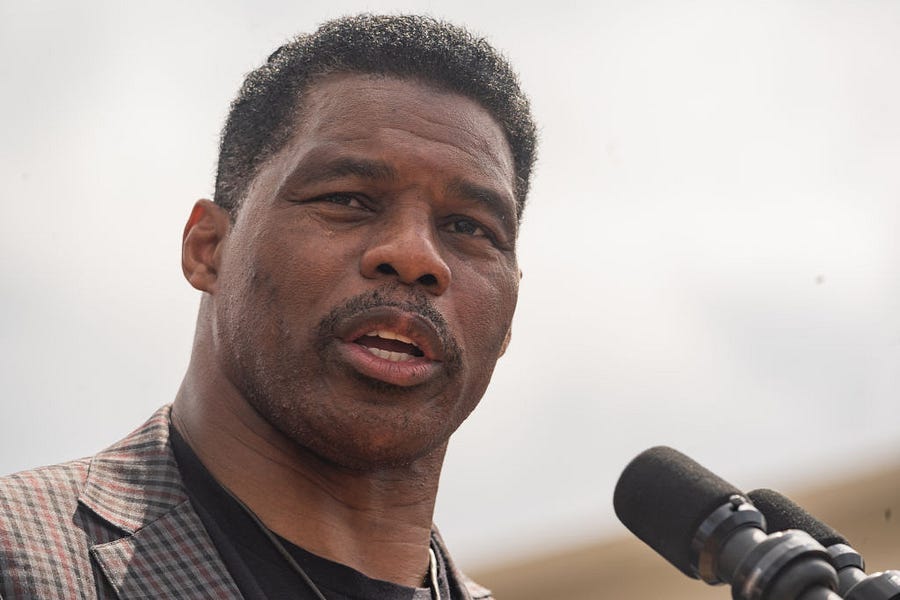Politics makes cynics of us all but Republican politics in the Trump era has a special fragrance, more nihilism than cynicism. Cynicism is when you expect your leaders to behave shamelessly and excuse them for doing so as a matter of partisan duty. Nihilism is when you celebrate your leaders for behaving shamelessly because it demonstrates resolve. What is shame, after all, except timidity in the face of convention?
I won’t rehash my first newsletter for The Dispatch, but I will double down on this line as a fair summary of why Trump appeals to populists: “A strong man is a dishonorable man, ruthless in pursuit of his goals and untroubled by the civic hobby horses of weaklings.” His refusal to be shamed by scandal after scandal, his insistence on aggressively attacking his accusers, is the essence of his reputation as a “fighter.” Scandal isn’t fatal for a modern Republican. Handled correctly, it’s an opportunity to show your party’s voters that you’re a fighter too.
Which is why the one-two punch Herschel Walker took on Monday night was greeted by most political junkies with a shrug. Walker is a populist and a longtime friend of Trump. He’s weathered many scandals already in Georgia’s Senate race and remains competitive in polling with Democratic incumbent Raphael Warnock in spite of it. When you read the new Daily Beast story accusing him of having paid for an abortion in 2009, or saw the hair-raising tweets from his son Christian that followed, two words likely sprang to mind: Access Hollywood. We’re about to endure a new Access Hollywood cycle in which a populist Republican is left for dead politically by the experts following an October surprise only to end up winning a few weeks later because it turns out voters want a renegade outsider to shake up the system.
A country willing to make a louche game-show host president is willing to make an unstable domestic abuser senator, or so we all assume. The cardinal rule of Trumpist populism abides: LOL nothing matters.
Doesn’t it?
I’m not so sure in this case.
My colleague Andrew Egger ably summarized the particulars of the new Walker scandal(s) in a piece yesterday. The Daily Beast piece cites evidence of a check signed by Walker and a get-well-soon card with an inscription that appears to be in his handwriting. A friend of the woman who allegedly aborted his child corroborated the story and says the woman told her of Walker’s paternity at the time. All of this is damning, and all the more so because Walker supports banning abortion without exceptions. He claims he’s always been pro-life.
But it’s hardly insurmountable as a political matter. “A better candidate would have leaked the details of a past scandal to a more friendly news institution, talked about the hard lessons and what he learned, how he became a better person, and then after a few days declare it old news,” Jim Geraghty wrote yesterday, astutely. Walker speaks often of redemption and could have easily folded the story of a girlfriend’s abortion into a tale of belatedly seeing the light, a Saul-on-the-road-to-Damascus moment.
Or he could have followed the Trumpier, more pugnacious approach to damage control described by Theodore Johnson in the Bulwark:
There was a time when an ostensibly pro-life politician asking his mistress to get an abortion would be a career death knell. But Donald Trump’s presidential campaign modeled how to overcome the most sensational disclosures: have no shame, label the accusations either fake news or harmless locker room talk, embrace the fallibility as a humanizing feature to be contrasted against elites’ holier-than-thou sheen, and demonize your political opponents to make them a wholly unacceptable alternative.
Even a talented Republican populist would have trouble pulling off a defiant so-what-if-I-did defense to a claim that he’d paid for an abortion, but one can imagine Walker resolving not to address the subject lest he “play the libs’ game” or whatever. “The left continues to focus on my past while I focus on America’s future,” he might say. “I won’t let them distract us from the issues that matter to voters.” Treating the allegation as a sort of Democratic dirty trick—even if it’s true—would condition most right-leaning voters to deem it out of bounds when considering how to vote this fall. Walker could, in other words, try to turn the matter into a loyalty test in which only the disloyal are willing to so much as entertain the subject.
Instead, for reasons I can’t discern, he quickly denied the story and vowed to sue the Daily Beast for defamation on Tuesday. As of Tuesday afternoon the suit still hadn’t been filed; we’re “considering our options,” his lawyers told reporters, no doubt fearing how the pre-trial discovery process might play out. The “fake news” defense would have made sense if the evidence of the abortion were thinner, no more than a he said/she said. But between the documentation the Beast obtained and the risk that the woman who provided it will come forward before the election, Walker may end up looking not just like a cad but a liar. Voters will forgive caddishness but I don’t know that they’ll forgive being brazenly lied to.
If you believe previous reporting, knee-jerk denial is how Walker tends to react to allegations of personal scandal. He’ll deny, deny, deny, even to his own campaign staff, only to sheepishly admit the truth once the evidence becomes irresistible. His response to the Daily Beast story may have been another example of it, succumbing to the instinct to lie rather than craft a thoughtful response like Geraghty’s. Certainly, Walker’s first attempt to spin the matter in a television interview wasn’t terribly convincing.
That’s one reason the populist force field of shamelessness might not protect him from this scandal. He’s conceding that the Daily Beast story would be shameful if true and asking voters to trust him that it isn’t. If that trust is repaid by making them feel like fools once the facts come out, they might not forgive him. Populists are supposed to own the libs, not their own side.
By itself, an abortion scandal wouldn’t sink Herschel Walker. Even if he admitted to everything, even if he offered no apology, one shouldn’t underestimate the extent to which negative partisanship defines the modern Republican Party. Republican voters would reason that, for all his faults, Walker would still cast wiser votes as a U.S. Senator than Raphael Warnock would—including and especially on abortion policy. Warnock isn’t free from scandal himself, you know.
The real threat to Walker’s candidacy comes from his son, Christian.
Christian Walker is a kind of celebrity in his own right, having built a huge following on social media. Importantly, his politics are similar to his father’s. Christian isn’t the wayward progressive in an otherwise conservative family, he’s a so-called “MAGA influencer.” A left-wing child accusing his right-wing father of misconduct could be safely dismissed as a case of partisanship gone haywire or an act of youthful rebellion, nothing to be taken seriously.
But Christian Walker rebuking Herschel Walker is MAGA-on-MAGA rhetorical violence, a bit like Trump Jr. flaying Trump Sr. publicly for some impropriety. (Unthinkable, admittedly.) Ulterior motives to explain his actions aren’t so easily contrived by Herschel’s defenders. It’s one thing for the “fake news” Daily Beast to accuse Herschel Walker of paying for an abortion, it’s another for his own child who’s amassed credibility among the populist right to hint that the story is true.
And to do more than that, frankly.
Some populists were at such pains to spin Christian’s allegations that they took to wondering whether his account might have been hacked and exploited by sinister leftists.
As became clear on Tuesday morning, his account was not hacked.
More than once in his tweets and videos this week Christian has insinuated that he and his mother have damning stories of their own they could tell about Herschel but haven’t, at least not yet. (“You have no idea what me and my mom have survived.”) He’s become a key character witness against his father in the court of public opinion at a decisive moment.
Which leaves Walker’s campaign and the Georgia Republican Party in a tight spot. How should they handle Christian? “This is a deeply disturbed kid with obvious issues of his own,” one GOP official told the Atlanta Journal-Constitution. “He’s a spoiled brat and is solely to blame if Herschel loses the race.” Antagonizing a relative who’s nursing a grudge and already dropping dark hints about the sordid stories he might tell seems reckless to me. Even the most plausible theory by which one might call Christian a liar, that he’s making things up to punish Herschel for being an absentee father, isn’t a great narrative for the campaign. But if Republicans don’t try to answer Christian’s attacks somehow, they risk implying that those attacks are unanswerable because they’re true.
Which is another reason the populist force field of shamelessness might not protect Herschel Walker this time. The force field works by convincing Republican voters that they betray the party when they let themselves be bothered by accusations leveled by Democrats. But it’s not only Democrats who are vouching for the abortion story in this case. It’s Christian Walker. And Christian isn’t just a “MAGA influencer.” He’s Herschel’s son.
This time the call is coming from inside the house.
The obvious counterargument to the foregoing is that Herschel Walker has the good fortune this year to be running on the same ticket as a popular incumbent governor. Whatever their misgivings about Walker, most Republican voters remain fierce partisans. So when they turn out en masse for Brian Kemp in the name of crushing Stacey Abrams, they’ll inevitably check the box for Walker too. Kemp will carry his scandal-prone colleague over the finish line.
That’s the theory. But is it reality?
It may be true that most Republicans are strict partisans but how many is “most”? Much depends on the answer. Comparing Kemp’s polling with Walker’s reveals the existence of an unlikely breed of voter in Georgia this year, people who are supporting Kemp for governor but Raphael Warnock for Senate. RealClearPolitics’ polling average has Kemp leading Abrams by roughly 7 points while Warnock leads Walker by just over one point. If those averages hold up on Election Day, the small split-ticket faction in Georgia may end up handing control of the Senate back to Democrats next year even as they’re sending Brian Kemp on to another four years as governor.
The idea of Kemp-Warnock voters seems fanciful given the ideological chasm between the candidates, but Tim Miller of The Bulwark visited Georgia recently and met a few proverbial unicorns in the political wild. (“Sometimes in races like these I’m still tempted to go the write-in or third party route, but I think this race could be close enough that I want to go the pro-democracy, character-matters-most route.”) I suspect there are many more Kemp voters who can’t bring themselves to back Warnock but who nonetheless view Walker as incoherent and unequal to the job and are unsure if they’ll support him out of blind partisan loyalty. The abortion scandal may be the last little nudge they need to recuse themselves from the Senate race, tipping it to Warnock.
Georgia being Georgia, the most likely outcome of the November election is a photo finish in which neither candidate reaches 50 percent, setting things up for another January runoff. Kemp won’t be on the ballot in January assuming that he reaches 50 percent in his own race against Abrams, as seems likely. Which raises the question: Will the reluctant Herschel Walker voters who turn out enthusiastically for Kemp in November bother turning out in the cold for Walker in January? Especially after they’re inundated with three months of ads about the abortion story and Christian Walker’s response to it?
Bear in mind that Warnock’s ad team has already skillfully weaponized Walker’s scandals to depress Republican enthusiasm about him. From Erick Erickson:
Warnock’s team has one of the most effective TV ad strategies in the country. A particularly devastating ad against Walker is an interview of Walker’s ex-wife on ABC’s Nightline about Walker holding a gun to her head and abusing her. You’d never know from the ad that Walker participat[ed] in the interview. It was about Walker’s battles with mental health and their shared attempt to raise awareness.
The context does not matter. It’s a damn powerful ad. That ad is having an impact on Christian women who don’t like Warnock but have so many doubts about Walker they may sit it out. Add to that his purported hypocrisy over abortion and the Warnock strategy seems very clear.
Warnock’s voters will turn out. All he needs to do to win is convince a critical mass of Republicans not to get off the couch in January to help elect a candidate of dubious character.
Normally this would be the point where we pause, recall the Access Hollywood episode, and say in unison, “LOL nothing matters.” Dubious character is never an obstacle to getting elected in the post-Trump era! Except that it is, occasionally. I refer you to the Alabama special election in 2017, when Roy Moore blew a Senate seat in a state Trump won by nearly 28 points the year before. Granted, he barely blew it, losing by a 1.5 points despite a history of controversies as a jurist and an eleventh-hour accusation of prior sexual misconduct with minors before the election.
But the idea that Republican populists are always and ever bulletproof with respect to scandal simply ain’t true. And if it ain’t true in a Trump +28 state like Alabama, it’s unlikely to be true in a Biden +0.2 state like Georgia.
Even Trump isn’t bulletproof to scandal. He’s essentially bulletproof among Republicans, leading Ron DeSantis in the latest 2024 primary poll by 39 points despite the myriad civil and criminal investigations pending against him. But among the wider electorate of registered voters, YouGov found this week that 51 percent believe he shouldn’t be allowed to serve as president again versus 35 percent who say he should. For all the populist hype about Trump’s ability to turn out new voters, he received a smaller share of the popular vote against two weak Democratic non-incumbents than Mitt Romney did against a sitting president in 2012. Questions about his character hurt him in 2016 and continue to hurt him now.
Although the “questions” have shifted over time from concerns about his willingness to use “locker-room talk” to concerns about his willingness to overthrow the duly elected government of the United States.
What makes Trump formidable, and why he’s often perceived as scandal-proof, is the degree of loyalty he commands from two different groups of Republicans. To the MAGA diehards, he’s the head of a strongman personality cult; to the rest, the “better the autocrat than the Democrat” partisans, he’s now spent more than half a decade as a singular hate object for the liberals whom they despise and are keen to spite. Trump has also only ever run for president, making it easy for him to argue that the fate of the country turns on his victory or defeat. For all of these reasons, when an election becomes a referendum on him, he can count on Republicans to turn out en masse. They’re heavily invested in him, emotionally and politically.
When an election becomes a referendum on a newbie politician like Herschel Walker for one out of 100 Senate seats, it’s anyone’s guess what will happen.
For Trump’s own sake, turnout for Walker had better be brisk. Yesterday he issued a statement that aims to ensure it will be:
Spoken like a man with zero doubt that he could convince his fans that his own handwriting on a get-well-soon card isn’t really his handwriting but rather some “deep state” forgery.
Trump is worried about Walker because he knows he’ll be blamed, fairly or not, if Republicans end up losing this race. As Georgia’s greatest football hero, Walker probably would have won the primary even without Trump’s backing—although I’m curious to know what would have happened if Trump had drafted a more polished populist, like Doug Collins, to run instead. As it is, Trump’s endorsement of Walker left no doubt as to the outcome. Mitch McConnell soon endorsed him as well, sensing that resistance was futile, and now the entire party is straining under the sunk costs of their political investment as scandal news swirls.
DeSantis supporters would relish the chance to blame Trump ahead of 2024 for having blown another Senate seat in Georgia after having blown two last year. Walker’s decades-long relationship with Trump will make it easy to frame his failure as Trump’s failure, further evidence that the former president is toxic to voters in key swing states. That argument will prove especially potent if other Trump endorsees lose otherwise winnable swing-state races this fall – Blake Masters in Arizona, Mehmet Oz in Pennsylvania, and particularly J.D. Vance in deep-red Ohio. The narrative will sprout overnight that Trump cost Republicans the Senate again, that he’s become a liability to the party, and that a more electable candidate, ahem should be the next nominee.
And wounded Republican voters who are smarting from their party’s underperformance in the Senate might be momentarily open to listening to it.
Walker’s “LOL nothing matters” scandal may end up mattering a lot, in other words. Not only to his own race and to control of the Senate next year but to the presidency in 2024.









Please note that we at The Dispatch hold ourselves, our work, and our commenters to a higher standard than other places on the internet. We welcome comments that foster genuine debate or discussion—including comments critical of us or our work—but responses that include ad hominem attacks on fellow Dispatch members or are intended to stoke fear and anger may be moderated.